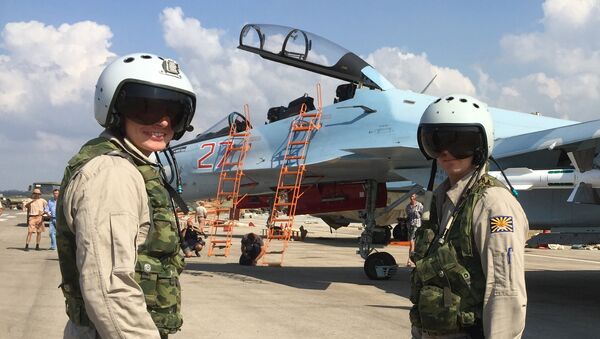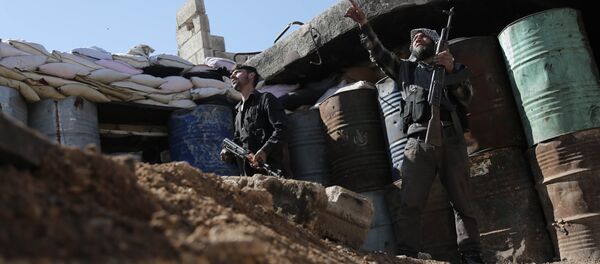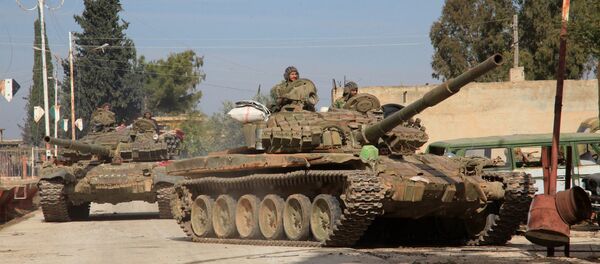In a recent analytical brief dedicated to the fledgling peace plan, Giles, an associate fellow at the UK-based current affairs and foreign policy think tank Chatham House, begrudgingly admitted that "the agreement on a limited cessation of hostilities in Syria has achieved some of its immediate aims of reducing bloodshed and creating conditions for the delivery of urgent humanitarian aid."
However, he added, "by meeting a wide range of Russian objectives, not limited to Syria itself, it also stores up trouble for the West. In particular, the agreement has confirmed for Russia that assertive military intervention is the most effective means of achieving swift and positive (for Moscow) foreign policy results."
"Russia has every reason to be satisfied with the current agreement," Giles wrote. "It achieves a Russian goal that has been consistent since the beginning of the conflict in Syria: stopping military operation by opposition forces against the Assad government." Moreover, "those opposition groups that signed up for the ceasefire plan also undertook to join the next round of peace talks in Geneva, in exchange for the promise – whether sincere or not – of no further attacks from the government or from Russia."
"This," the analyst dubiously suggested, "is in line with another key aim for Russia: a negotiated transition of power in Syria, rather than the forcible removal of President Bashar al-Assad previously insisted on by the United States."
In any case, Giles complains that "the single biggest detriment of the ceasefire agreement is that it demonstrates once again that direct military action overseas is Russia's best method of achieving strategic objectives, with little if any adverse consequence."
"Syria," he argues, "represents the fourth occasion, following Kosovo, Georgia and Ukraine, where decisive Russian military intervention has substantially altered the situation in Moscow's favor." Russian "military adventurism," the analyst paradoxically suggested, would only be encouraged by the ceasefire.
Worse yet, in Giles view, "the current rounds of claim and counter-claim over the extent of the ceasefire, and indeed where and to whom it applies, were inevitable. Russia had already announced that it would carry on with military operations against 'terrorists'. This is in line with the intent of the ceasefire plan, but Russia continues to label as 'terrorists' anybody they wish to attack, including parts of the US-backed opposition. Moscow," the analyst disingenuously notes, "has a consistent history of exploiting loopholes in ceasefire agreements, or indeed ignoring them altogether."
#Russia please stop bombing terrorists! #Syria #USA #SaudiArabia #Quatar #Turkey #IS #AlNusra #Alkaida #AlQuaida pic.twitter.com/1sqcESCdEZ
— jasper (@_jasper___) 21 февраля 2016 г.
The "likely end result" of the Syrian campaign is for the West's anti-Russian sanctions to be lifted, "especially if Russia appears to be working alongside Western plans to tackle ISIS, and continues to succeed in its information campaign convincing the West that Ukraine is to blame for the failure to implement the Minsk protocols."
Ultimately, Giles suggested, "the agreement also furthers the Russian aim of being a power broker in the Middle East, and the long-cherished objective of recognition of Russian influence. Partnering with the United States to monitor the ceasefire chimes with Russia's yearning for its former role as the other superpower in a bipolar world. In this way, the plan can be seen in Moscow as a step toward reversing the 'historical anomaly' of reduced Russian global influence following the end of the Cold War."
Incidentally, in January, in an interview for the German newspaper Bild, the Russian president voiced exactly the opposite concept: that Russia has no claim to "the role of a superpower," and that "this role is very costly and it is meaningless." That, naturally, does not preclude Russia from taking its rightful place in the emerging multipolar world order, as the United States' influence declines, but nor does it mean that Moscow wants to duke it out with Washington for global hegemony.
Worse yet, "the United States can be portrayed as having abandoned its allies: Secretary of State John Kerry announced that the opposition groups which the US was supporting would make themselves targets for continuing airstrikes and ground operations if they did not cooperate with Russia's plans and sign up to the ceasefire and the political negotiations."
"Following the September 2013 chemical weapons agreement, this represents the second high-profile occasion that Secretary Kerry has been used as a tool to endorse and validate a plan for Syria that was drawn up in Moscow."
The supposed connection between Russia's military operation in Syria and its tête-à-tête with the NATO forces stationed near or on Russia's borders is something Giles doesn't really get into. Still, his begrudging admission that Moscow's Syrian anti-terrorist operation has been a success so far is something the Kremlin might find comforting, even if the advice that might follow from his logic (reactivating the Syrian conflict?) (providing more support for 'moderate' terrorists?) is not.









